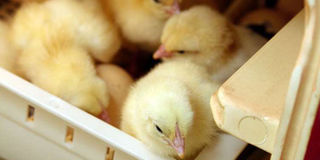Instead of hatching eggs, my incubator ‘cooked’ all of them

Day old chicks displayed during an Agricultural show in Jinja. PHOTO | MORGAN MBABAZI | NATION MEDIA GROUP
When I reached home from work at round 7pm on Thursday last week, Rosemary, my worker, had some urgent message for me.
“Come and see,” she beckoned me towards the incubator. “It is hot like an oven,” she added.
“What happened?” I asked her in shock as I felt the heat from the gadget. She explained that when she went to open the door of the incubator earlier in the day to replace the water in the lower chamber, she had noticed that it was very hot inside.
I had no idea how to fix the problem as Rosemary looked at me, waiting for a solution. I called the supplier, Wakoli.
He asked me to check the temperature. The lower part was reading 37 degrees Celsius but the upper reading was oscillating and the machine was beeping continuously.
The following day, Wakoli sent a technician. Everything seemed in order, from the element, the fan and the motor.
But there was a problem. A cardboard, which I had placed on the window to prevent rain getting into the veranda, and a piece of polythene bag had blocked the opening of the fan at the back and instead of the hot air getting out, it was getting back into the incubator.
I have been using the incubator for four months and had not encountered any problems. However, what is important is how and where you place the incubator. The back of the incubator should not be placed against a wall because this interferes with air circulation.
Also, keep checking the back to ensure nothing is blocking the space between the fan. This is the mistake I made.
As I looked at the machine, I recalled an email from a reader, Esther Maina, two weeks ago. She had been having problems with her incubator and the hatch-rate was low, at between 37 and 45 per cent. I normally have a hatch-rate of above 80 per cent, meaning, out of every five crates of eggs that I incubate, about 120 successfully hatch into chicks.
Esther said she had done everything right. She had set the temperature of her automatic incubator at 37.8 degrees Celsius and humidity at 60 during the first 18 days (three days to hatching). She had readjusted the temperature and humidity to 37.5 degrees and 70 respectively from day 19 to 21. So why was she getting poor results?
For the best outcome, temperature and humidity regulation are not the only consideration if one is using an automatic artificial incubator.
It all begins with fertilisation. Maintain a cock for every 10 hens to increase the hatchability of the eggs. Second, ensure the eggs are stored properly after laying in a cool place with the narrower end facing downwards. This is because the broad end of the egg has an air bag through which the embryo breathes.
If the egg is stored with the broad end facing down, and touching a hard surface, this blocks the pores and the embryo dies from suffocation. Do not clean the eggs with a wet rug before incubating.
It is also important to consider how long the eggs have stayed before they are incubated. Do not incubate eggs older than 10 days. In my case, I only incubate eggs less than seven days old. If you are buying eggs from an external source, it may be difficult to verify how old they are.
You can use a candler to test eggs before placing in the incubator and when they are incubating to determine if the embryo is able to develop and hatch into chicks.
I strictly adhere to the above-mentioned recommendations, but as I have always intimated in my pieces, in farming, you must have a strong heart. Things often do not go right, and the annoying thing is that it is always not your fault.
Anyway, I removed the 180 eggs from the incubator and they appeared ‘cooked’. There were no signs of an embryo as I examined them with a candler. I disposed of all of them.
For now, I am counting losses. I had an order to deliver 150 day-old chicks just before Christmas to Stanley and Lucy from Utawala in Nairobi, but I cannot honour my promise. Lucky for me, Stanley was understanding and he agreed to have the order delivered in January.
Obwogo is a poultry farmer, a medical doctor and a senior quality improvement adviser in health policy and systems strengthening.





